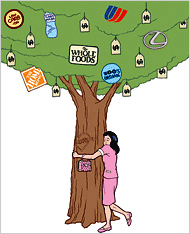- 9 reads

Shamed as I am to admit it, I am not much of a green consumer.
This past weekend, as I shoved everything I owned into empty cardboard boxes scattered around my apartment, I realized that I was an environmentalist’s worst nightmare. Here were the demons stacked before me: dozens of jeans, shoes, and electronics. Nothing organic, not a stitch of fair trade. The Levi’s I had worn since junior year of high school were most likely produced in less than eco-friendly conditions, as were the various t-shirts and dresses that had invaded my closet since the ninth grade. The sole “green” item in my room was a light bulb I had purchased a few days earlier at Ikea.
The bevy of stuff before me left me feeling guilty. With all of this junk in my possession, was it possible that I held even the slightest concern for Mother Nature?
In the past few years, green products have gone from the fringes to mainstream America, bringing in profits and marketing interests faster than you can say “climate change.” While all of these products help to inform and encourage more responsible consumption, I wonder whether the issue at hand is the persistent need to purchase rather than simply purchasing the wrong things.
Take my apartment, for example. Though there were no bamboo bowls or cutlery, all of my kitchen supplies had been well-used for over two years. The microwave was a hand-me-down from my older cousin’s college days; my parents had used the utensils in my drawer for years before I received them as a graduation present. I hand-wash all of my dishes (no dishwashers have been installed in dorms just yet), and avoid plastic cups or plates.
The bulk of my wardrobe has seen me through high school graduation on to my junior year of college. I can’t even remember the last time I purchased a new pair of jeans. I hang-dry my clothing after it’s been washed, and I give old clothes to Goodwill.
In an age where reducing one’s carbon footprint is as trendy as trimming one’s waist, the line between fashionable and responsible often becomes blurred. Consumers are too often told that they need to replace, revamp, and reconsider rather than reduce, reuse, and recycle. Perfectly good clothes are trashed for organic cotton alternatives. 35 miles-per-gallon petroleum vehicles are “upgraded” to a hybrid Lexus that gets less than 30 mpg.
Green products are designed to reduce waste, but by casting off older products that still have use in them you’re still being wasteful. It’s easy to purchase organic products and say we’re doing our part to reduce our carbon footprints, or to ditch old products in the name of “green.” The more difficult—and necessary—task is to truly live in a sustainable manner. Living in a suburban McMansion with a Prius parked out front isn’t nearly as good for the planet as living in an urban area and taking public transportation. At the end of the day, it’s not environmentally or economically practical to preach the green gospel while tossing linoleum tiles for bamboo flooring.
My apartment surely isn’t Mother Nature’s best friend—but it’s not her worst enemy, either. Maybe if more people were forced to live the life of an urban college student with limited means, we could truly reduce our impact on an already impoverished environment.

